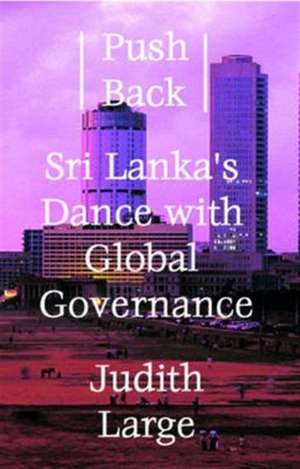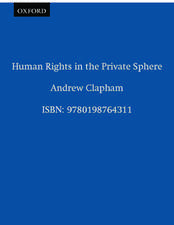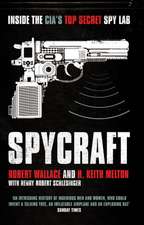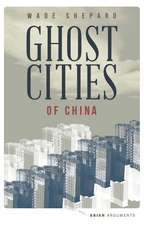Push Back: Sri Lanka's Dance with Global Governance
Autor Judith Largeen Paperback – 14 ian 2017
After decades of conflict, the Sri Lankan government in 2009 proclaimed the decisive defeat of the Liberation Tamil Tigers of Elam. Since then, the state has proved resistant to attempts by the UN and other international bodies to promote postwar reconciliation. In this incisive new work, Judith Large investigates the ways in which the Sri Lankan government has been able to subvert international diplomatic efforts, and she explores the wider context of rising Sinhalese nationalism, the attendant growth of discrimination against Tamils, and efforts by both the Tamil diaspora and groups within Sri Lanka to lobby the international community.
The implications of Large’s work also extend far beyond Sri Lanka to the larger conversation about the integral role the international community plays in negotiating an end to conflicts and supervising the rebuilding of post-conflict societies. Push Back will be vital reading not only for those interested in Sri Lanka, but for those interested in the wider implications of the conflict for human rights, peacemaking, and geopolitics.
The implications of Large’s work also extend far beyond Sri Lanka to the larger conversation about the integral role the international community plays in negotiating an end to conflicts and supervising the rebuilding of post-conflict societies. Push Back will be vital reading not only for those interested in Sri Lanka, but for those interested in the wider implications of the conflict for human rights, peacemaking, and geopolitics.
| Toate formatele și edițiile | Preț | Express |
|---|---|---|
| Paperback (1) | 154.08 lei 3-5 săpt. | |
| ZED BOOKS – 14 ian 2017 | 154.08 lei 3-5 săpt. | |
| Hardback (1) | 511.57 lei 6-8 săpt. | |
| ZED BOOKS – 14 ian 2017 | 511.57 lei 6-8 săpt. |
Preț: 154.08 lei
Preț vechi: 166.80 lei
-8% Nou
Puncte Express: 231
Preț estimativ în valută:
29.48€ • 30.87$ • 24.40£
29.48€ • 30.87$ • 24.40£
Carte disponibilă
Livrare economică 17-31 martie
Preluare comenzi: 021 569.72.76
Specificații
ISBN-13: 9781783606542
ISBN-10: 1783606541
Pagini: 200
Ilustrații: Maps
Dimensiuni: 140 x 216 x 25 mm
Greutate: 0.39 kg
Editura: ZED BOOKS
Colecția Zed Books
Locul publicării:London, United Kingdom
ISBN-10: 1783606541
Pagini: 200
Ilustrații: Maps
Dimensiuni: 140 x 216 x 25 mm
Greutate: 0.39 kg
Editura: ZED BOOKS
Colecția Zed Books
Locul publicării:London, United Kingdom
Notă biografică
Judith Large is a senior research fellow at the Conflict Analysis Research Centre and a member of the Experts Roster for the Mediation Support Unit within the United Nations Department of Political Affairs.
Cuprins
Acknowledgements
Abbreviations
Timeline of Sri Lankan history
Foreword
Map of Sri Lanka
Introduction: reflections on ‘optics’- Sri Lanka and dilemmas in the study of violence and global governance
1 War’s end and competing models for recovery
2 Executive presidency and the unitary state
3 Non-interference Sri Lankan style
4 The outsiders
5 Majoritarianism or divide and rule
6 Home-grown solution and the quest for accountability
7 Small state in a large system
Notes
Bibliography
Index
Abbreviations
Timeline of Sri Lankan history
Foreword
Map of Sri Lanka
Introduction: reflections on ‘optics’- Sri Lanka and dilemmas in the study of violence and global governance
1 War’s end and competing models for recovery
2 Executive presidency and the unitary state
3 Non-interference Sri Lankan style
4 The outsiders
5 Majoritarianism or divide and rule
6 Home-grown solution and the quest for accountability
7 Small state in a large system
Notes
Bibliography
Index
Recenzii
“Offers a fascinating account of the Sri Lankan government’s tense relationship with the international community. Filled with sharp insights, Pushback will help us all have a better sense of where Sri Lanka may be headed.”
“This important new volume is essential reading for those wishing to understand the decades-long conflict in Sri Lanka, the quest for accountability, and the challenges of building peace in the wake of conflict.”
“Incisively interrogates Sri Lanka’s socio-political fabric under the Rajapaksa regime . . . the book sheds new light on how the government got away with outrageous human rights violations, even after the war. It is essential reading for understanding the politics of the period.”
“A brilliant exposition of the end game in the Sri-Lankan civil war. This book is essential background reading for anyone interested in how civil wars end and the role of different actors in these processes.”
“The first serious academic study of the Rajapaksa regime’s manipulation of the international system, which enabled them to preside over mass atrocities and get away scot free.”
“Few inquiries have offered the theoretically incisive lens adopted here. . . . Combing a nimble, Foucauldian conceptualization of the rapidly changing landscape of ‘global governance’ and notions of ‘illiberal peacebuilding.’”
“An exceptionally detailed and carefully crafted study. . . . The book strikes an excellent balance between accessibility of style and empirical rigour. . . . A satisfying combination of facts and rigorous analysis that will be a vital source for anyone engaging in research, development or policy work in Sri Lanka now and in the future.”














